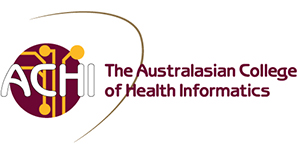SUPPLEMENTARY LEARNING PROGRAM
Curriculum
The domains of the supplementary learning curriculum include:
- The principles and practice of health informatics
- translational bioinformatics
- clinical informatics
- consumer health informatics
- public health informatics
- Principles of clinical and organisational safety practice and implementation
- Leadership and management
- Policy and advocacy
- Scholarship and teaching
- Professionalism
Learning Program
The learning program will include:
- Master Classes (attend and participate in 3 per year)
- Journal Clubs (attend and participate in 3 per year)
- Annual Colloquium (attend and participate in one per year)
- Work placement reports (a mid term and final report per per work placement)
- Lead a Journal Club (once during program)
MASTER CLASSES
Overview
Interactive virtual seminars led by FACHI experts in Health Informatics.
Selected ACHI Members and Fellows may also attend.
Calendar Year Requirements
Candidates are required to attend and participate in three Master Classes per calendar year.
Candidates should allow one to one and a half hours per session for attendance, participation and reflection.
Total Program Requirement
Candidates will attend twelve Master Classes (approximately twelve to eighteen hours) over a four-year program.
Candidate Requirements
Candidates are required to:
- Complete any pre-work as per the session briefing
- Attend and participate in the Master Class
- Complete the post Master Class activity or reflection
An ACHI FbT Program representative will attend each Master Class and will determine if candidates have met requirements.
FAQs
1. Who will be presenting the Master Classes?
Current ACHI Fellows, across all disciplines, will be invited to present and lead the Master Classes.
2. Who will facilitate the Master Classes?
An ACHI representative will facilitate the Master Classes, inviting candidates to interact and engage with the presenter and other candidates.
3. Will Master Classes be recorded, and if so can I access the recordings rather than attend/participate in the session?
Yes, Master Classes will be recorded. However, candidates are required to attend the session and participate. Recordings are only available by request.
4. How will my participation in the Master Class be assessed?
Candidates are required to complete any pre-work outlined in the session brief which will be circulated 14 days prior to the Master Class. Candidates are also required to engage in the Master Class, by answering questions, asking questions, and or sharing insights related to their experience. The ACHI representative who will facilitate the session will determine if candidates have met requirements.
5. Can I contact the Master Class presenter after the session?
The presenter will advise best mode of contact post Master Class.
JOURNAL CLUB
Overview
Journal clubs will be led by Fellowship Program candidates. Each Journal Club will be one to two hours in duration and one to two papers will be discussed.
Selected ACHI Members and Fellows may also be invited to attend the Journal Clubs.
Calendar Year Requirements
Candidates are required to attend and participate in three Journal Clubs per calendar year. Candidates should allow up to four hours to prepare for and participate in each journal club.
Total Program Requirement
Candidates are required to lead and present one paper during their time in the Fellowship Program. Allow up to 10 hours to select a journal, prepare for discussion and lead a Journal Club.
Candidates will attend and participate in a total of twelve Journal Clubs over the duration of a four-year program (plus one Journal Club where they are the lead).
Candidate Requirements
Candidates are required to:
A. Prepare, present and lead group discussion of one journal in one Journal Club
B. Prepare for, attend and contribute to the discussion in additional Journal Clubs
An ACHI Fellowship Training Program representative will attend the Journal Clubs and will determine if the candidate has met requirements.
FAQs
1. When will I find out what Journal Club I will be presenting and leading?
The Fellowship Program Manager will be in touch with you to schedule a Journal Club for you to present and lead
2. Is ACHI support available to me when preparing for the Journal Club?
Yes, please contact the Fellowship Program Manager if you require support.
3. How will my participation in the Journal Clubs be assessed?
The ACHI representative who will facilitate the session will determine if candidates have met requirements.
ANNUAL COLLOQUIUM
Overview
An annual event for candidates to share and discuss their PhD and work placement/s. The colloquium will be facilitated by an ACHI Fellow and ACHI Members and Fellows will be invited to attend.
This event will be in conjunction with HISA and HINZ’s annual conferences.
Calendar Year Requirements
Candidates should allow one full day (eight hours) for the colloquium plus up to eight hours preparation and reflection time per calendar year.
This does not include travel time.
Total Program Requirement
Candidates will attend four one-day colloquiums over a four-year program.
Candidate Requirements
a) Candidates are required to present their PhD Thesis or work placement experience, which will be followed by a Q&A session.
Each PhD presentation will include:
- Background
- Aims
- Method
- Progress to date
b) Candidates will also be required to contribute to discussion on other candidate presentations.
ACHI Scientific Chairs will review and provide feedback on candidate presentations.
Note: more specific details on what is required for the presentation will be provided to candidates at least 60 days prior.
FAQs
1. Are travel and other associated expenses to attend HIC or HINZ covered by ACHI?
Unfortunately, ACHI is unable to contribute to costs to attend. We recommend that you explore funding opportunities through your university.
2. If I am unable to attend the Annual Colloquium what are the consequences?
Attendance at the Annual Colloquium is compulsory. If you are unable to attend with notice, or you are unable to attend on the day due to unforeseen circumstances please contact the Fellowship Program Manager.
3. What if my host organisation (for my work placement) does not allow me to attend HIC or HINZ?
Please advise the Fellowship Program Manager if this is the case.
WORK PLACEMENT REPORT
Overview
Candidates are required to complete two paid work placements as part of their program. They will be discussed as part of a mid term progress meeting and a final meeting on completion of the work placements.
During the work placement candidates will also be interviewed by an ACHI representative (not their mentor) about their experience. The ACHI representative will also visit the candidate at the host organisation premises.
Candidates will also be required to complete a mid term progress report and a final report for each work placement which outlines:
- Feedback about the work placement experience
- Leadership development
- Health informatics theory and skill development
Total Program Requirement
For each work placement (x2) candidates should allow:
- Up to 1 hour for the interview and site visit component
- Up to 2 hours for the mid term and final work placement report and meeting
Volume of Learning
A schedule of supplementary learning will be affixed to your Letter of Offer if you are accepted into the Fellowship by Training Program.
As a guide, candidates will be required to complete 150 hours of supplementary learning over the four years of the program. This equates to approximately 38 hours per calendar year.
Candidates that participate in the program for less than four years will be required to demonstrate equivalence of additional learning and development (outside of their PhD requirements). Candidates will be given further guidance on demonstrating equivalence once they are enrolled into the Fellowship by Training Program.
If a candidate does not complete (or provide equivalent evidence of) the required volume of learning they will not meet the requirements of the Fellowship by Training Program and will jeopardise their opportunity to be awarded ACHI Fellowship.
Assessment
The Fellowship by Training Program will be using Entrustable Professional Activities1 (EPA’s) to assess candidate progress. This is not a competency-based training program.
An EPA is entrusted when the supervisor or educator is confident that the learner can be trusted to perform an activity at the required standard without more than distant supervision.1
The supervisor/educator will feel confident that the learner knows when to ask for additional help and the learner can be trusted to appropriately seek assistance in a timely way.
A learner gains entrustment performing an activity before progression to subsequent stages of training.2
Tracking and monitoring progress
We will use a points system to track mandatory annual and program requirements. More information on the points system will be provided once you are enrolled into the FbT Program.
Candidates are required to provide a portfolio of supplementary learning evidence at the end of the program. This will be reviewed by the Governance Board who will then recommend to ACHI that the candidate be awarded Fellowship.
Candidates must submit their portfolio of evidence within 2 years of being awarded their PhD.
FAQs
1. How is my progress in the Fellowship by Training Program monitored?
The Fellowship by Training Program using a points system to track candidate completion of mandatory requirements of the supplementary learning program. Candidates are responsible for ensuring they meet annual and total program requirements.
2. What evidence do I need to provide throughout the FbT Program?
Candidates are required to submit:
- Copies of Annual Reports from the candidate’s university showing satisfactory progress
- Evidence of retrospective additional learning to support the log book (e.g. attendance certificates, evidence of published journal articles).
3. What are some examples of retrospective learning?
Examples include, but are not limited to, the following:
- Each non-traineeship year in a Health Informatics paid position in an organisation (max. 4 years)
- Each completed year as an honorary office bearer of a Health Informatics professional organisation or incorporated association
- Being directly responsible for a major and successful Health Informatics project, which impacts on the Health or IT industry as a whole or on other areas outside the applicant’s immediate working environment
- Outstanding innovations in the advancement of Health Informatics within the Health or IT industries, Governments or Non- Government Organisations, or the Community
- Publication of a refereed research paper or book chapter on Health Informatics or a recognised sub-discipline (not including publications as part of your PhD)
- Authorship or editorship of a published book on Health Informatics or a recognised sub-discipline
- Awarding of a significant competitive Health Informatics grant, where the applicant is a chief or principal investigator
- Development, presentation or organisation of a new Health Informatics professional development seminar of one full day or more
- Presentation (but not publication) of an invited or refereed paper on Health Informatics or a recognised sub-discipline at a national or international conference.
4. How is progress of my PhD measured?
You will be required to submit annual reports from your university showing satisfactory progress. ACHI does not assess or measure your PhD.

APPLY NOW
Applications are open on an ongoing basis and assessed for intake in June and December each year.
Click below to open the application guide which includes links to the application form.
